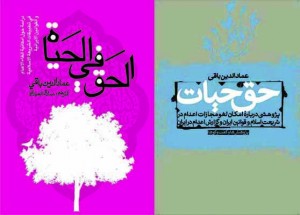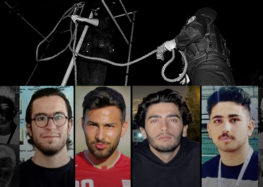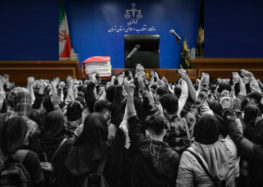Sharia and Islamic Jurisprudence Allow for Abolition of the Death Penalty

Right to Life in Arabic and Persian
Click here to download “Right to Life” in Persian
Click here to download “Right to Life 2” in Persian
(1 December 2008) An Arabic translation of “Right to Life”, a book by Iranian human rights defender Emad Baghi, has been published by the Arabic Network for Human Rights Information and the International Campaign for Human Rights in Iran. The book presents groundbreaking research in Islamic jurisprudence and Sharia supporting the suspension and abolition of capital punishment in countries following Islamic law.
“Right to Life” has been banned by Iranian authorities and Baghi has been imprisoned and interrogated several times for articles he wrote making the arguments collected in this book.
The book is a comprehensive exposition of Baghi’s research arguing for abolition and suspension of the death penalty in Iran and other Islamic countries. As he wrote in a letter to the head of the Iranian Judiciary in April 2006, “Crime, felony, and executions are the results of and contributors to a culture of violence.” He has been tirelessly promoting abolition of the death penalty in Iran, and demonstrating that neither Qur’anic verses nor Islamic jurisprudence pose obstacles toward this goal.
“Right to Life” is an important and timely contribution to religious, political and civil society discussions in Iran and other countries that implement capital punishment under their interpretation of Islamic Sharia. As the worldwide movement towards abolition of the death penalty has gained unprecedented momentum in recent years, Islamic countries constitute one of the main blocks opposing this trend in the international arena. What is more, the practice of capital punishment isolates Islamic countries from the international community.
Baghi’s book provides persuasive arguments within the Islamic discourse for suspension and abolition of death penalty sentences in countries whose laws are based on an interpretation of Sharia. It is often argued that such laws are irrevocable, but Baghi’s research demonstrates that there is no such absolute requirement for the death penalty within Sharia or the Qur’anic verses.
The book is organized into three chapters: on executions in Sharia; on stoning; and on the abolition of the death penalty and alternative sentences. The first chapter argues that all death penalty punishments are legislated and implemented by governments and are not derived from Qur’anic verses. According to Baghi’s research, in cases of murder with the punishment of Qisas, or retribution, death sentences are not necessarily required by Qur’anic verses.
Baghi demonstrates that Qur’anic verses for retribution provide for pardons as well as blood money alternatives and do not impart an absolute requirement for carrying out executions. His research shows that when retribution is chosen, the decision of the next of kin is the necessary but not sufficient condition. He makes the important contribution that Islamic traditions could allow for inclusion of expert opinions—such as psychologists, sociologists, and criminologists—in addition to a public jury to determine the final sentencing. Therefore, a judge and the next of kin of the victim are not necessarily the only persons who may be responsible for making the final decision in cases of retribution relating to murder.
Baghi’s discussion of stoning in cases of adultery and its legal roots provides the powerful argument that such sentencing has no grounds in Qur’anic verses and indeed the death penalty is not prescribed by the Qur’an as its proponents advocate. “The stoning verdict in traditional Islamic jurisprudence (fiqh) is a legal command but it has no basis in the Qur’an,” he concludes.
Baghi’s conclusions are captured in his words of April 2006 to the head of Iranian Judiciary, Ayatollah Hashemi Shahrudi: “The killing of a human being is both the source and propagator of violence and has no relationship to kindheartedness, a caring society, and the benevolence of the Creator. It is hence necessary to stop the spread of crime, felony as well as executions as soon as possible.”
The book’s second volume, “Right to Life II,” arguing against application of death penalty for juvenile offenders will be published soon.
—————————-
(Cairo, 18 August 2009) The Arabic Network for Human Rights Information (ANHRI), in collaboration with the International Campaign For Human Rights In Iran, has published an Arabic translation of “Child Executions, A Study of Roots and Proposed Intellectual And Jurisprudential Solutions,” by Iranian human rights defender and winner of the 2009 Martin Ennals Award for Human Rights, Emad Baghi.
Baghi presents comprehensive research on child executions, a punishment that is still inflicted in a few Islamic countries. His study is based on arguments supported by Islamic and international law, and concludes that abolishing any form of death penalty is necessary, including the execution of child offenders convicted of crimes they committed under the age of 18.
This study is the second part of Baghi’s book, “Right to Life,” in which he focuses on abolishing child executions and goes further in discussions that support abolishing child execution based on Islamic laws and arguments that prove that Islamic countries can eradicate this penalty.
The author analyzes the intellectual and jurisprudential basis for executing children for crimes committed under 18 years of age in countries that depend on Islamic arguments in their legislation, Iran being one of them, and thereby reaching the conclusion of the necessity of abolishing this punishment. Throughout his study, Baghi refers to Koranic verses, Islamic jurisprudential rules, and the principles of human rights.
The book is banned in Iran, as was its first volume, because of its bold arguments in criticizing the penal codes in Iran and due to Baghi’s objection to some interpretations of Islamic laws. Baghi was imprisoned because of his activities in defense of human rights, yet he prepared this research while in Evin prison in Tehran. He was released in July 2008.
Because of his outstanding efforts in defending human rights and specifically abolishing the death penalty, Baghi was awarded the 2009 Martin Ennals Prize for Human rights, one of the most important prizes in human rights recommended by 10 human rights eminent organizations.
The Arabic Network for Human Rights Information ( ANHRI) and the International Campaign For Human Rights In Iran translate and published this study in Arabic as a valuable document to assist policy makers, legislators, Shura council members and scholars in Islamic countries in making new laws and legislations based on Islamic references and human rights standards, which gives assurance that Islamic jurisprudence does not contradict efforts to abolish death penalty, and in particular to end the execution of child offenders.
There are currently five Islamic countries, three of which are Arab countries, whose legal codes allow for the execution of child offenders: Iran, Saudi Arabia, Sudan, Yemen and Pakistan.
—————————-
For Baghi’s Letter to Judiciary in English click here.
For Baghi’s Article “The Bloodied Stone” in English click here.
To order a free hard copy of “Right to Life” in Arabic send an email to:
Omaima Gassim: [email protected]






